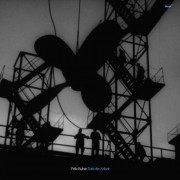Gegenwelt (Parallel World) is the second LP by CEL, a duo Kubin and Zemler formed. More melodically-evolved than their eponymous 2020 debut, it is an even more explicit example of the syncretic impulse that impelled these guys to form the band. Their basic notion was to explore the juncture between two streams of German underground sounds — the Motorik 4/4 rhythms first posited by Can’s Jaki Liebezeit and Kraftwerk’s Klaus Dinger, and the sequencer-driven brain loops of early, experimental pioneers of the NDW, such as der Plan.
|
Originally developed as a film score »Takt der Arbeit« is inspired by a handful of industrial and instructional films from the early 1960′s until the early 1990′s that portrait different forms of work. Felix Kubin is translating these historic documents into a musical poem of conceptual depth. »Takt der Arbeit« – the beat of work – is not only serving as a title but also as constructive element in this endeavour. Being hunted down by the ever accelerated pulse of our reality is an omnipresent issue in capitalist societies of the the Western world. Living in times of constant exhaustion, it’s not only our bodies that have been disciplined by and synchronized to the rhythms of working processes, but also our minds that rage in the tempo of our surroundings. Following an almost analytical effort, Kubin and an ensemble of 3 percussionists are investigating the different qualities and intensities of time that are catalyzed in working processes. While picking up precise temporal and motoric motives of the films, condensing paces and excavating rhythmic patterns, the ensemble is mapping out an animist choreography, shifting from a time when labour was still relying on bodily efforts to a time when machines and ticking clocks seem to reign and model our perception. While Side A is dedicated to procedures that are still based on manual and mechanical movement, Side B is inspired by the digital age, marked by invisible processes and subcutaneous pulses that we internalize. The result is a critical and poetic reflection on the rhythms of our daily life and yet another example of Felix Kubin’s skills as a composer, placing him in the field of orchestral music. |



